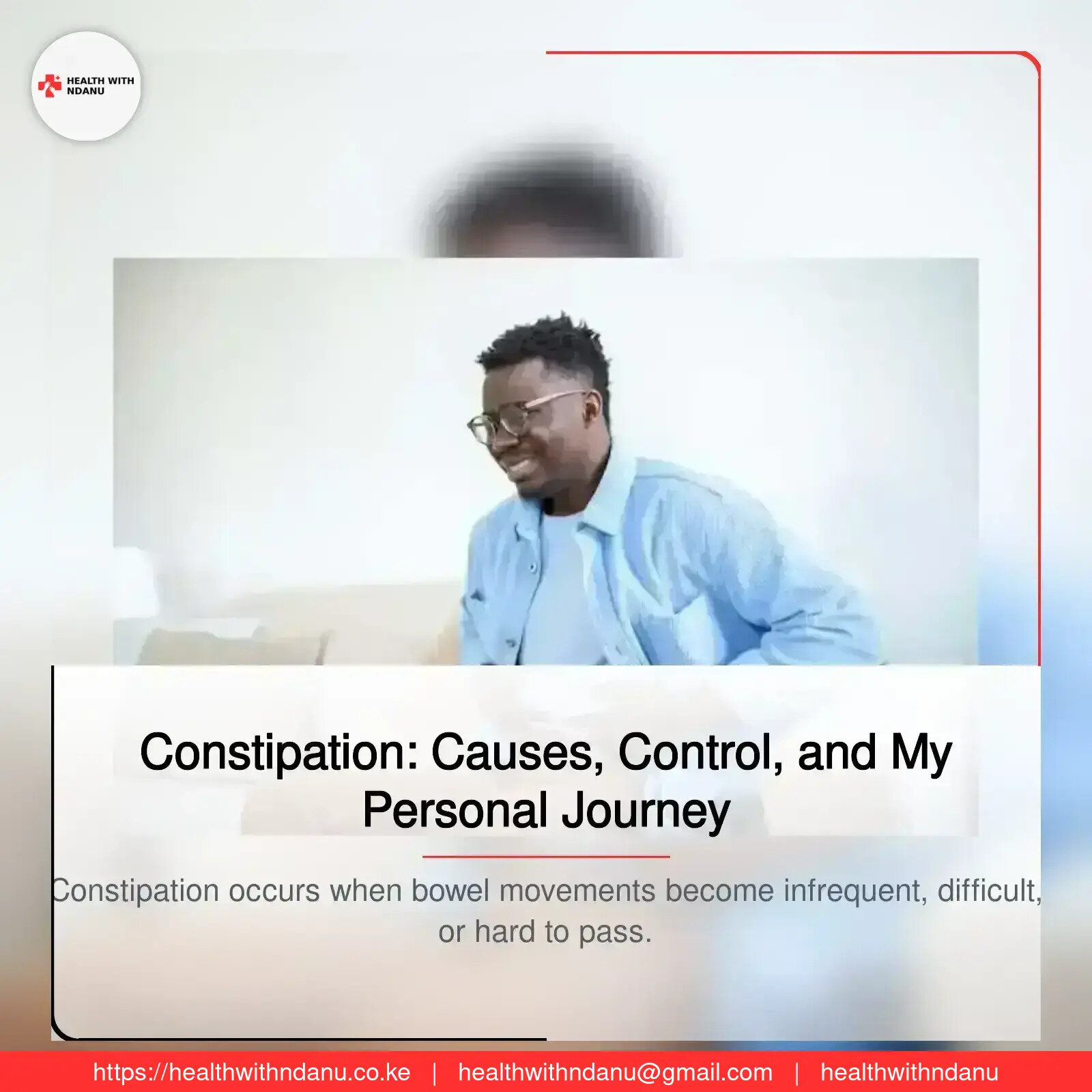Constipation: Causes, Control, and My Personal Journey
- by Diana Ndanu
- 08 March, 2025
- 0 Comments
- 5 Mins



Introduction
Constipation is a condition many people experience but often hesitate to talk about. It can be frustrating, uncomfortable, and even painful, affecting daily life and overall well-being. As someone who has battled constipation frequently, I understand the struggle firsthand. In this article, I’ll share what constipation is, its causes, natural remedies, and how I’ve learned to manage it.
What is Constipation?
Constipation occurs when bowel movements become infrequent, difficult, or hard to pass. While normal bowel movement frequency varies from person to person, going fewer than three times a week is generally considered constipation. It may also come with symptoms like:
- Hard, dry, or lumpy stools
- Straining during bowel movements
- Feeling like you haven’t fully emptied your bowels
- Bloating and discomfort
Causes of Constipation
Constipation can be caused by multiple factors, including diet, lifestyle, and underlying health conditions. Here are some of the most common causes:
1. Low Fiber Diet
Fiber helps add bulk to stool and promotes smooth movement through the digestive tract. A diet lacking fiber-rich foods like vegetables, fruits, whole grains, and legumes can lead to constipation.
2. Not Drinking Enough Water
Dehydration can make stools dry and hard, making them difficult to pass. If you don’t drink enough water or hydrating fluids, your digestive system slows down.
3. Lack of Physical Activity
A sedentary lifestyle slows down digestion. Regular movement and exercise help stimulate bowel activity, preventing constipation.
4. Ignoring the Urge to Go
Delaying bathroom visits due to a busy schedule or discomfort can make stool harder and more difficult to pass over time.
5. Stress and Anxiety
Stress affects digestion and may slow down bowel movements. Anxiety and emotional distress can also contribute to gut imbalances.
6. Medications
Certain medications, such as painkillers (opioids), antidepressants, and iron supplements, can cause constipation as a side effect.
7. Underlying Medical Conditions
Conditions like irritable bowel syndrome (IBS), thyroid disorders, diabetes, and neurological diseases can also contribute to chronic constipation.
My Personal Journey with Constipation
I’ve struggled with constipation for years, and it’s been both physically uncomfortable and mentally exhausting. There were days when I felt bloated, sluggish, and frustrated with my body. I tried different laxatives, but they provided only temporary relief, and I didn’t want to rely on them.
Through trial and error, I realized that small lifestyle changes made a huge difference. Here’s what worked for me:
1. Increasing Fiber Intake
I started incorporating fiber-rich foods like oats, chia seeds, flaxseeds, apples, and green leafy vegetables into my diet. Slowly but surely, my digestion improved.
2. Staying Hydrated
Drinking at least 2–3 liters of water daily was a game-changer. I also included herbal teas like peppermint and ginger tea, which helped with bloating.
3. Moving More
I began walking for at least 30 minutes daily and doing light yoga poses like twists and stretches that aid digestion. Movement helped keep my bowels active.
4. Establishing a Routine
I made it a habit to go to the bathroom at the same time every morning. This helped train my digestive system to follow a natural rhythm.
5. Natural Remedies
I found relief using:
- Warm lemon water in the morning to stimulate digestion.
- Prunes and dates, which acted as natural laxatives.
- Probiotics (like yogurt and fermented foods) to improve gut health.
How to Naturally Relieve and Prevent Constipation
If you’re struggling with constipation, these natural remedies may help:
1. Eat More Fiber
Aim for 25-30g of fiber daily by including:
- Whole grains (oats, brown rice, quinoa)
- Fruits (apples, pears, berries)
- Vegetables (spinach, carrots, sweet potatoes)
- Legumes (beans, lentils, chickpeas)
2. Drink Plenty of Water
Hydration is key! Try drinking:
- Warm lemon water in the morning
- Herbal teas (peppermint, ginger, or chamomile)
- Coconut water for added electrolytes
3. Stay Active
Physical movement stimulates digestion. Try:
Daily brisk walks
Yoga poses like seated twists
Light stretching or abdominal massage
4. Add Natural Laxatives
- Prunes, figs, and dates help soften stool.
- Chia and flaxseeds absorb water and create bulk.
- Aloe vera juice has a mild laxative effect.
5. Reduce Stress
Practice deep breathing, meditation, or gentle yoga to manage stress and promote gut health.
When to See a Doctor
While occasional constipation is normal, you should see a doctor if you experience:
- Chronic constipation lasting more than 3 weeks
- Severe bloating or abdominal pain
- Unexplained weight loss
- Blood in stool
Final Thoughts
Managing constipation naturally is possible with the right dietary and lifestyle changes. Through fiber-rich foods, hydration, movement, and stress management, I’ve seen significant improvements in my digestive health. While I still have occasional struggles, I now feel more in control.
If you also battle constipation, start by making small, sustainable changes and listen to your body. Your gut health plays a crucial role in your overall well-being!
Would you like a personalized meal plan or specific remedies based on your symptoms? Let me know how I can help!
Got Your Own Experience? Share with us
Kategoria Maarufu
Blogu Zinazotembelewa Zaidi
Daily Newsletter
Get all the top stories from Blogs to keep track.



